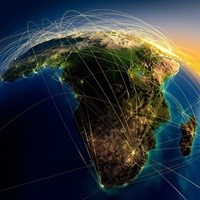






The African Union, with its related institutions, aims at inculcating an ethos of good governance and responsible leadership on the continent to give expression to this message and provide assurance to international partners. This, in addition to the recent adoption of Agenda 2063 - Africa's first long term programme for socio-economic development - has been key to overhauling the African brand image and saying to the world that Africa is open for business.
These efforts have also contributed directly to the reputation of the continent. According to the Reputation Institute, improved national and continental reputation results in more tourism; ability to attract a greater share of global FDI; increased exports; ability to attract international skills and talent; and better public diplomacy.
Recent analysis of foreign direct investment (FDI) into Africa tells us that the investment by the leaders of the continent into improving governance and development are bearing fruit and actively contributing to the transformation of the image of the continent. Africa is increasingly becoming a viable investment destination that can be correlated with a more positive continental reputation and image. Africa's ability to attract a significant share of global FDI also bodes well for the continent's developmental agenda and suggests that Africa is doing something right to convince investors that their investments are safe.
According to the recently released Africa Investment Report 2015 compiled by fDiIntelligence "FDI into Africa [in 2014] increased by 64% to US $87bn [which represents] 660 projects." This amounts to 13% of global FDI, which has increased from 0.6% in 2000. The 464 multinational companies that have invested in the continent are saying without equivocation that Africa is open for business and is a safe and reliable investment destination.
The most attractive sectors for investors are: financial services with 133 projects; the coal, oil & natural gas sector with 25 projects and a combined capital investment value of US $33bn; the real estate sector with 23 projects and a capital investment of US $12bn; the industrial machinery sector with 33 projects. The auto components sector reflected an improved performance of 133% while the value of projects in the business machines as well as software & IT services sectors increased by 378% and 72%, respectively. FDI projects in the chemicals sector amounted to US $7bn indicating an increase of almost 2000% from 2013 and the alternative & renewable energy sector saw US $10bn being invested across the continent.
The benefits of FDI on developing countries are well documented. According to the OECD, and other studies, "FDI triggers technology spill overs, assists human capital formation, contributes to international trade integration, helps create a more competitive business environment and enhances enterprise development. All of these contribute to higher economic growth, which is the most potent tool for alleviating poverty in developing countries." The areas where we are seeing the most investment also improve the quality of life for citizens.
Africa's ability to attract increasing amounts of the global share of FDI is however, only part of the continent's success story. Increased FDI must equate to economic growth and development of human capital. This requires strong leadership from both the public and corporate sectors.
Human capital is, according to the OECD "paramount to a country's ability to both attract FDI and maximise spillovers from foreign enterprise presence." Africa must capitalise on the competitive advantages of multinational enterprises (MNEs) resident on the continent - which are an important source of research, development and technology - to develop continental technological competencies and the human capital to maintain such competencies.
The development of Africa's human capital is a key pillar of Agenda 2063. Increased FDI, if used efficiently, can provide governments with a catalyst to both develop and supply human capital for domestic and international business.
While FDI can also be a catalyst for the integration of markets to facilitate more efficient and effective trade relations, Africa cannot rely on foreign investment alone and must drive its own integration. To this end, a firm foundation was laid when in June 2015 the Continental Free Trade Area (CFTA) negotiations were concluded. When fully implemented, the CFTA will build an integrated market that will see a market of over one billion people and returns of approximately US$ 2.6tr.
Intra-regional trade is already contributing to Africa's growth and the African Development Bank finds that "after decades of relative stagnation, the value of formal intra-African trade has increased almost fivefold in absolute terms between 2001 and 2012." In addition, "intra-African greenfield FDI projects as a percentage of greenfield inflows into Africa almost tripled between 2003-2013, from 7% in 2003 to over 21% in 2013."
The successful African growth story is therefore being driven both internally and externally. Various studies indicate a positive correlation between investment and future economic growth. The data suggests that there is every reason for citizens of the continent to be optimistic about prospects for growth and development for their countries and themselves.
The science and theory on brand development tell us that brand equity is built and strengthened by what brands do and not just what they say. The continent has made significant progress in transforming its image and reputation, which is supported by increased investment - from external markets as well as within the continent. Africa has certainly become a globally competitive investment destination.
The OECD cautions that although there are real economic benefits of FDI "they do not accrue automatically." Maximum benefits will ensue from a healthy enabling environment for business "which encourages domestic and foreign investment, provides incentives for innovation and improvements of skills and contributes to a competitive corporate climate."
Will history find the leaders of the continent able to seize the opportunities presented by the Africa Rising narrative to ensure that the African brand is built on what is done rather than what is said? Only time will tell...